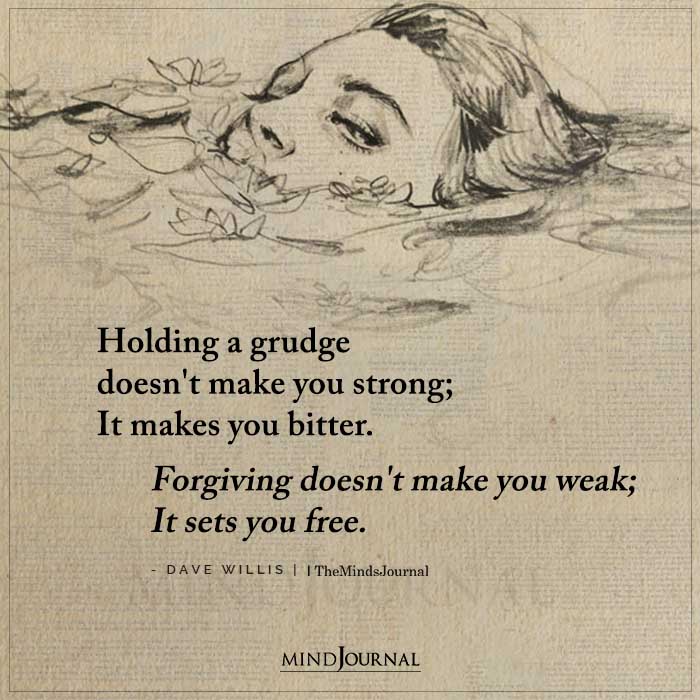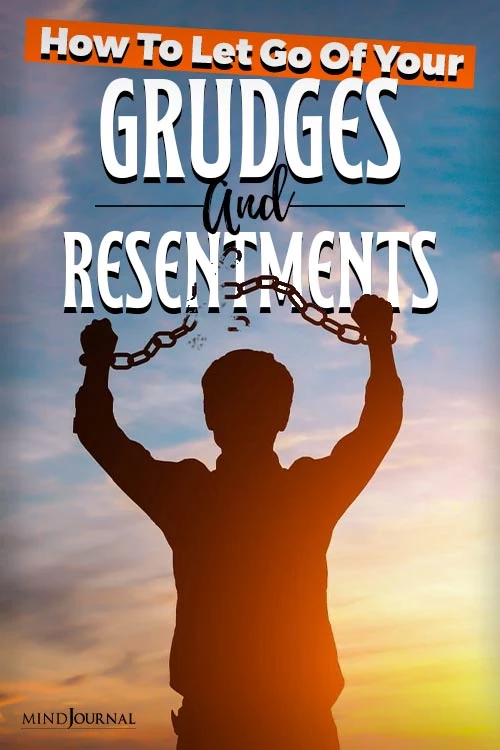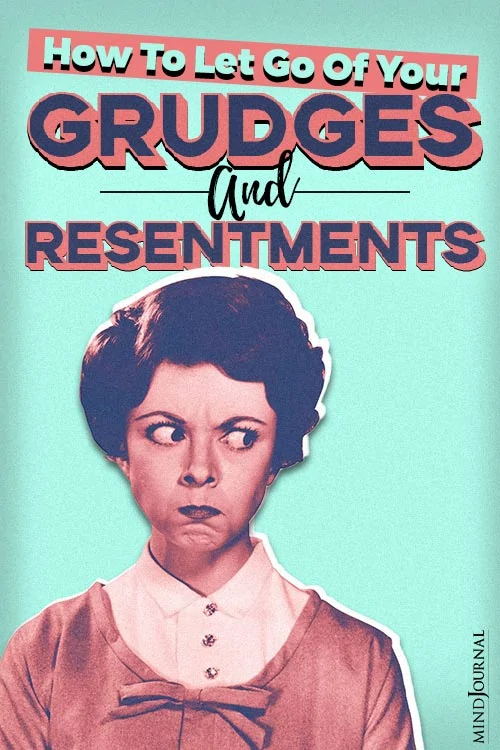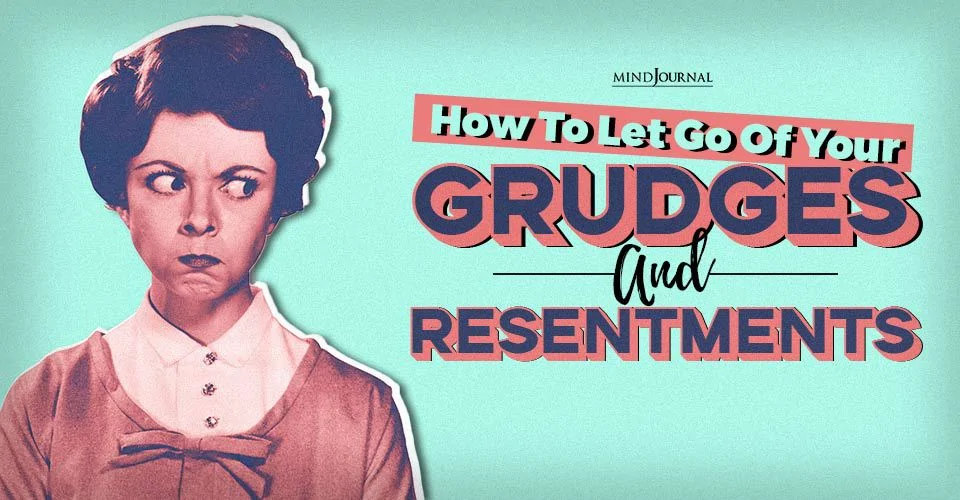In order to have a productive and successful life, you need to know how to release grudges. It is crucial for you to let go of your grudges so that they don’t keep you from growing and developing in your path.
How To Let Go Of Your Grudges by Dr Judith Orloff : As a psychiatrist, I feel strongly that letting go of resentments, a point I emphasize in my recent book “Emotional Freedom,” is essential to free yourself from negativity. The main person the resentment hurts is you.
Grudges And Resentment
Resentment is a grudge that you harbor after you’ve felt mistreated. It’s easy to hold on to all the incidents that angered you, from a gossiping hairdresser to a two-timing ex-husband. And, if you took a poll, you’d probably get a lot of people on your side about your right to stay resentful. According to such logic, as time passes, you have “the right” to get angrier, becoming a broken record of complaints.
But is that the sour person you want to be? Instead, for emotional freedom, try to release resentments and let compassion purify them. One friend, in the midst of that process, likened uncovering resentments to “dragging dead bodies out of a well.” You don’t want moldering negativity rotting your psyche.
Grudges And Forgiveness
Forgiveness is a state of grace, nothing you can force or pretend. I guide patients toward the large-heartedness to forgive both injuries others have caused and those they’ve self-inflicted. Forgiveness penetrates the impenetrable — the obstinacy that stifles love, the tenacious pain that dams our energy reserves.
A Stanford research study showed that forgiveness significantly decreases stress, rage, and psychosomatic symptoms. I’m not saying that betrayal is ever justified, that you aren’t entitled to be upset if someone wrongs you, or that you shouldn’t try to improve or else leave a destructive situation. Forgiveness, though, ensures that resentments don’t feed on your energy. Finally, remember forgiveness refers to the actor, not the act — not the offense but the woundedness of the offender.
Read: 20 Signs It’s Time To Let Go Of The Past And Move On
How To Let Go Of Your Grudges And Resentments
If you want to know more about how to let go of anger and grudges, and the relation between grudges and forgiveness, go through the following strategies carefully.

1. Set Your Intention to Release the Resentment
The purpose of releasing resentments is to increase your energy and to feel better. Select a target: a critical mother, a controlling boyfriend, a cutthroat colleague. Perhaps you’ve tried to discuss the grievance with no results. (Always attempt to work things out if the person is the slightest bit receptive.) Or your target may truly be unapproachable. In either case, away from the person, air your resentments without sugarcoating them. Do this in a journal, or with a therapist or friend. For example, say, “I despise the double-crossing conniver because…” Frankly, expressing your feelings is necessary to forgive.
The first step towards knowing how to let go of grudges starts with venting them out in your secret space.
2. Cultivate Forgiveness
In a quiet moment, really reach to find compassion for the person’s shortcomings, not the deed itself. This may be very hard work. What insecurities or fears motivated him or her? Why is the person’s heart so closed? What caused his or her moral blindness? Try to discern the context of the person’s actions. At this point, you may be inwardly able to ask yourself to start to forgive. Perhaps you’re not there yet — that’s okay. The request itself sets off a stream of compassion, cleansing of your system. Repeat the exercise once a day for at least a week. See if your energy improves. I’ll bet you’ll feel a burden lift.
You have to connect the dots between your held-up grudges and forgiveness capabilities so that you can move on with your life with little baggage.
3. Take a Reality Check
As part of forgiveness, take this reality check: People bring a lifetime of wounds to your relationship, which may make their behavior more about them than you. You might justifiably say, as one of my patients did, “I’m hurt and furious my spouse left me and refused to even talk about it. Isn’t it reasonable to want that?” Naturally, it is. But your need doesn’t take into consideration your spouse’s terror of intimacy, or that he or she would do anything to escape it in your relationship or any other. Unfortunately, your spouse’s fears and inadequacies won out over your needs.
To find forgiveness while endeavoring to heal anger, you must evaluate whom you’re dealing with, the good and the bad. Often, people are just doing the best they can, which may not amount to a hill of beans where you’re concerned, but it does represent the sad truth of the situation. Accepting the truth of someone’s limitations will help you to forgive.
Compassion opens a hidden door to a secret world that exists beyond anger. Notwithstanding, the feelings of anger or forgiveness aren’t mutually exclusive. You can simultaneously experience varying degrees of both. Perhaps, at first, you’re a little forgiving and very angry. But when you progress, the scales increasingly tip toward forgiveness as your attachment to anger recedes.
Read: 4 Easy Ways To Let Go Of Negativity From Your Life
“If I stayed angry at other people, I would miss finding friends among those I was angry with.”
–Rosa Parks, from an interview in “Positive Energy“
Written By: Judith Orloff, M.D Originally Appeared On: Dr. Judith Orloff
Some More Helpful Tips On How To Let Go Of Your Grudges:
- Realize the importance of forgiveness and the necessity to move on with your life.
- Identify the key problem areas that need to be healed.
- Join a peer support group.
- Acknowledge how the hurt has affected you in order to learn how to release grudges, that you hold against it.
- Step out from the victim role and take the power back from the one who caused you pain.
Read: 6 Buddhist Practices To Help Let Go A Relationship

Be Patient With Yourself While You Learn How To Release Grudges
Be gentle with yourself in this journey of self-empowerment. If you find yourself faltering, then before wondering how to let go of your grudges, emphasize how to forgive yourself and be considerate of your learning pace.
Your anger and resentment should not overpower you; instead, choose to heal and take the reins back in your hands. Once you are able to understand the dynamic between grudges and forgiveness, you will be able to let go of your anger and grudges once and for all.










Leave a Reply
You must be logged in to post a comment.